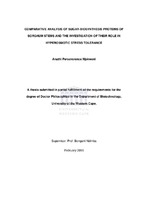| dc.contributor.advisor | Ndimba, Bongani | |
| dc.contributor.author | Njokweni, Anathi Perseverence | |
| dc.date.accessioned | 2015-05-08T07:46:39Z | |
| dc.date.available | 2015-05-08T07:46:39Z | |
| dc.date.issued | 2015 | |
| dc.identifier.uri | http://hdl.handle.net/11394/4110 | |
| dc.description | Philosophiae Doctor - PhD | en_US |
| dc.description.abstract | Sorghum bicolor (L.) Moench is an important cereal crop currently explored as a potential bio-energy crop due to its stress tolerance and ability to ferment soluble sugars. Physiological studies on sorghum varieties have demonstrated that part of drought tolerance is attributed to sugar accumulation in the sorghum stems. Despite the agronomic advantages of sorghum as a bio-energy crop, more research efforts towards the molecular elucidation of sorghum traits that confer drought tolerance are necessary. Particular focus on traits, which could potentially contribute to an efficient bio-energy production under environmental constraints, would be an added advantage. This study examined the role of sugar biosynthesis proteins in conferring tolerance to drought-induced hyperosmotic stress, and ultimately osmotic adjustment in sorghum varieties. Sorghum bicolor (L.) Moench varieties (ICSB338, ICSB73, ICSV213 and S35) with different levels of drought tolerance, were grown under watered conditions until early anthesis after which, a 10-day water deficit period was introduced | en_US |
| dc.language.iso | en | en_US |
| dc.publisher | University of the Western Cape | en_US |
| dc.subject | Sorghum | en_US |
| dc.subject | Abiotic stress | en_US |
| dc.subject | Osmotic adjustment | en_US |
| dc.title | Comparative analysis of sugar-biosynthesis proteins of sorghum stems and the investigation of their role in hyperosmotic stress tolerance | en_US |
| dc.type | Thesis | en_US |
| dc.rights.holder | University of the Western Cape | en_US |

